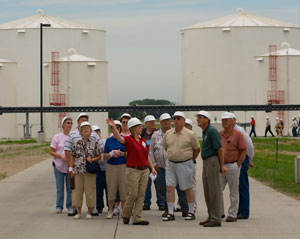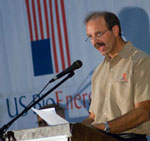 Illinois Senator and Democratic presidential hopeful Barack Obama made a stop in Charles City on his five day tour of Iowa last week to help cut the ribbon at the grand opening of the third ethanol plant for VeraSun Energy.
Illinois Senator and Democratic presidential hopeful Barack Obama made a stop in Charles City on his five day tour of Iowa last week to help cut the ribbon at the grand opening of the third ethanol plant for VeraSun Energy.
Obama says ethanol “ultimately helps our national security because right now we’re sending billions of dollars to some of the most hostile nations on earth, and makes it more difficult for us to shape a foreign policy that is intelligent and is creating security for the long term.”
 Other dignitaries at the event included National Corn Growers Association CEO Rick Tolman, Renewable Fuels Association president Bob Dinneen, Dr. Mary Beth Stanek with General Motors; Don Endres, VeraSun Energy Corp. chairman, CEO and president; and Mike Adams, host of the national farm program AgriTalk.
Other dignitaries at the event included National Corn Growers Association CEO Rick Tolman, Renewable Fuels Association president Bob Dinneen, Dr. Mary Beth Stanek with General Motors; Don Endres, VeraSun Energy Corp. chairman, CEO and president; and Mike Adams, host of the national farm program AgriTalk.
To see more pictures from the grand opening, including the ones on this post, go to the AgriTalk website.
In other VeraSun news, the company announced the acquisition with ASAlliances Biofuels, LLC for three ethanol plants with a combined annual production capacity of approximately 330 million gallons per year. The three facilities are each expected to operate at 110MMGY and are located in Linden, Indiana; Albion, Nebraska; and Bloomingburg, Ohio – only the Linden facility is currently open.
This brings VeraSun’s total production capacity to 450 million gallons per year with four facilities in operation and another 550 million gallons of capacity under construction at five different sites. In addition to the Linden facility, VeraSun has operating plants in Aurora, South Dakota and Fort Dodge and Charles City, Iowa. Construction is also underway at Hartley, Iowa; Welcome, Minnesota; and Reynolds, Indiana.


 The U.S. House’s version of the Farm Bill includes a provision where the federal government buys surplus sugar and sells it to ethanol producers to be used with corn.
The U.S. House’s version of the Farm Bill includes a provision where the federal government buys surplus sugar and sells it to ethanol producers to be used with corn. The chairman of the House Agriculture Committee, Minnesota Democrat Collin Peterson, inserted the sugar-to-ethanol provision in the farm bill. Minnesota is the nation’s largest producer of sugar beets, and Peterson represents the state’s sugar beet-growing Red River Valley. U.S. sugar is made from beets in some Northern and Western states, and cane in a few Southern states and Hawaii.
The chairman of the House Agriculture Committee, Minnesota Democrat Collin Peterson, inserted the sugar-to-ethanol provision in the farm bill. Minnesota is the nation’s largest producer of sugar beets, and Peterson represents the state’s sugar beet-growing Red River Valley. U.S. sugar is made from beets in some Northern and Western states, and cane in a few Southern states and Hawaii. The U.S. Senate is expected to take up the bill when it comes back in after the August recess. And this current provision has the endorsement of the chairman of the Senate Ag Committee, Sen. Tom Harkin (D-Iowa):
The U.S. Senate is expected to take up the bill when it comes back in after the August recess. And this current provision has the endorsement of the chairman of the Senate Ag Committee, Sen. Tom Harkin (D-Iowa): In a blur of yellow… pushed by a yellow flame shot out of the back of a J60 Pratt and Whitney jet engine… this Corvette funny car might be one of the fastest things on Earth.
In a blur of yellow… pushed by a yellow flame shot out of the back of a J60 Pratt and Whitney jet engine… this Corvette funny car might be one of the fastest things on Earth. For more than 100 years, The Sir Walter Scott has sailed the waters of Loch Katrine in Scotland… one of the last coal-powered steamers in the country. A 2.2 million Pounds (4.35 million U.S. dollar) renovation is due for the old girl, and officials want to run her on biodiesel.
For more than 100 years, The Sir Walter Scott has sailed the waters of Loch Katrine in Scotland… one of the last coal-powered steamers in the country. A 2.2 million Pounds (4.35 million U.S. dollar) renovation is due for the old girl, and officials want to run her on biodiesel. Banks tells Leno that he is “all over the idea of using E-85 to build the ultimate street rods.” The main point of the interview is that ethanol, in the form of E-85, is a very high performance fuel if the car engine is tuned to run on it.
Banks tells Leno that he is “all over the idea of using E-85 to build the ultimate street rods.” The main point of the interview is that ethanol, in the form of E-85, is a very high performance fuel if the car engine is tuned to run on it. 

 “The reality for communities from coast to coast to benefit from ethanol is here,” Gov. Heineman said. “Ethanol production is one of the major drivers of economic activity in small communities across our state, and I’m very pleased to have the opportunity to see this plant up and running.”
“The reality for communities from coast to coast to benefit from ethanol is here,” Gov. Heineman said. “Ethanol production is one of the major drivers of economic activity in small communities across our state, and I’m very pleased to have the opportunity to see this plant up and running.”  “As we celebrate the grand opening of US Bio Ord, I am pleased to reflect on the success of our company’s growth,” commented Gordon Ommen, CEO of US BioEnergy. “We are thrilled to be a member of the Ord community with a shared vision of energy independence and economic vitality.”
“As we celebrate the grand opening of US Bio Ord, I am pleased to reflect on the success of our company’s growth,” commented Gordon Ommen, CEO of US BioEnergy. “We are thrilled to be a member of the Ord community with a shared vision of energy independence and economic vitality.”
 A hydrogen-powered Ford Fusion has taken part in the annual Speed Week at the famous Bonneville Salt Flats this week and hit an amazing 161 MPH!
A hydrogen-powered Ford Fusion has taken part in the annual Speed Week at the famous Bonneville Salt Flats this week and hit an amazing 161 MPH! A new tradition at the 150-year-old Indiana State Fair has started this year as biodiesel powers the fair’s midway.
A new tradition at the 150-year-old Indiana State Fair has started this year as biodiesel powers the fair’s midway.